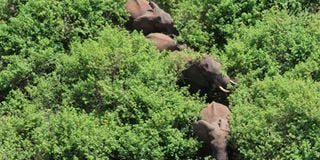KWS fails to account for Sh559m paid to human-wildlife conflict

Elephants in the Imenti Forest in Meru. The Auditor-General has put KWS on the spot for failing to account for Sh559 million the agency says it spent on settling human-wildlife conflict claims.
The Auditor-General has put the Kenya Wildlife Service (KWS) on the spot for failing to account for Sh559 million the agency says it spent on settling human-wildlife conflict claims.
Auditor-General Nancy Gathungu, in her audit report on KWS’s financial statements for the year to June 2020, says the agency recorded that it spent the amount to compensate individuals and families affected by wildlife.
“As disclosed in the financial statements, the operating and maintenance costs of Sh3.07 billion includes an expenditure of Sh559 million on compensation to victims of human-wildlife conflicts,” said Ms Gathungu.
However, KWS failed to give documentation to show the actual beneficiaries of the compensation, putting into question how the money was actually used.
“Supporting documents, including original claim forms from the victims, police reports, medical reports and minutes of deliberations from the County Wildlife Conservation and Compensation Committees (CWCCC) were not availed (sic) for audit review,” she said.
“In this circumstance, the accuracy and validity of the expenditure on wildlife compensation of Sh559 million could not be confirmed.”
Victims owed Sh2.6 billion
Parliament last month revealed KWS owes victims of human-wildlife conflict Sh2.6 billion in outstanding compensation claims dating as far back as 2017.
The National Assembly’s Environmental and Natural Resources Committee noted that the Sh606 million the agency has been allocated for compensation in the FY2022/23 is too little and will see victims of the conflicts wait longer for compensation.
“The verified and approved human-wildlife conflict pending claims that are likely to be carried forward to the financial year 2022/23 amount to Sh2.579 billion. However only Sh606 million has been provided to settle these claims in the financial year 2022/23,” said Parliament.
“Therefore close to Sh1.9 billion will be carried forward to the next financial year without including additional cases that will be verified and approved in the financial year 2022/23.”
Conflicts rampant
Human-wildlife conflicts are rampant especially at communities living near game parks and game reserves, often leading to destruction of crops, property and death.
In case of death, the next of kin of the victim is paid Sh5 million after the claim is verified.
Ms Gathungu also put the agency on the spot for failing to stop the encroachment of the Amboseli National Park by private developers, noting recent developments at the park endanger its viability and existence.
The Amboseli biosphere contains three zones – the national park, a buffer zone and a transition zone – which ought to remain intact to preserve the wildlife. But community ranches in the buffer and transition zones have been subdivided and their land use changed from natural livestock grazing and wildlife dispersal area to farming, said the Auditor-General.
Migratory routes blocked
“Lands that have been converted to farm lands have also been fenced out, hence blocking animals’ natural migratory routes and feeding grounds,” said Ms Gathungu.
“Consequently, the existence of the park is under threat from the neighbouring community and hence faces uncertainty of continued existence and sustainability.”
The Auditor-General also noted that Lake Nakuru National Park is under threat, after nearly half of the park was submerged due to rising water in the lake.
She said the size of the land is shrinking due to the rising water levels which has reduced the feeding grounds for animals.
Important infrastructure at the park such as its office headquarters, gate to the park and sections of roads at the park are submerged.





